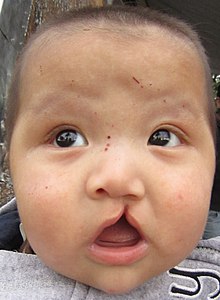Pai syndrome
| Pai syndrome | |
|---|---|
| Other names | Median cleft of the upper lip-corpus callosum lipoma-midline facial cutaneous polyps syndrome |
 | |
| Specialty | Medical genetics |
| Causes | Genetic mutation |
| Prevention | none |
| Prognosis | Good |
| Frequency | very rare, between 10-80 cases have been described in medical literature |
Pai syndrome, also known as Median cleft of the upper lip-corpus callosum lipoma-midline facial cutaneous polyps syndrome, is a very rare genetic disorder which is characterized by nervous system, cutaneous, ocular, nasal and bucal anomalies with facial dysmorphisms.[1]
Signs and symptoms[edit]
List of common symptoms:[2]
- Depressed nasal bridge
- Median cleft lip
- Central nervous system lipomas.
- Nasal polyposis
- Presence of skin tags
- Subcutaneous nodule
List of not-so-common symptoms:[2]
- Oral frenulum abnormalities
- Bifid uvula
- Hypertelorism
- Telecanthus
List of uncommon symptoms:[2]
- Missing/underdeveloped corpus callosum
- Down-slanting palpebral fissures
- Encephalocele
- Coloboma
- Nose defects
- Frontal bossing
- High palate
Causes[edit]
A specific, shared genetic cause hasn't been found. The closest thing to it was a case reported by Masuno et al. of a Japanese girl with symptoms of the disorder plus short stature and intellectual disabilities with a spontaneous reciprocal translocation. This translocation involved chromosome Xq28 and chromosome 16q11.2 (more specifically, 46,X,t(X;16)(q28;q11.2).[3]
Epidemiology[edit]
According to OMIM, 18 cases have been described in medical literature,[4] but according to ORPHAnet, 67 cases have been described.[5]
References[edit]
- ^ "Síndrome de Pai". Orphanet (in Spanish). Retrieved 2022-06-13.
- ^ "Median cleft of upper lip with polyps of facial skin and nasal mucosa". Genetic and Rare Diseases Information Center (GARD) – an NCATS Program. U.S. National Institutes of Health. 2021-11-19. Archived from the original on 19 November 2021. Retrieved 2022-06-13.
- ^ Masuno M, Imaizumi K, Fukushima Y, Tanaka Y, Ishii T, Nakamura M, Kuroki Y (November 1997). "Median cleft of upper lip and pedunculated skin masses associated with de novo reciprocal translocation 46,X,t(X;16)(q28;q11.2)". Journal of Medical Genetics. 34 (11): 952–954. doi:10.1136/jmg.34.11.952. PMC 1051130. PMID 9391896.
- ^ "Cleft, Median, of Upper Lip With Polyps of Facial Skin and Nasal Mucosa". Online Mendelian Inheritance in Man (OMIM). 155145. Retrieved 2022-06-13.
- ^ "Pai syndrome". Orphanet. Retrieved 2022-06-13.
